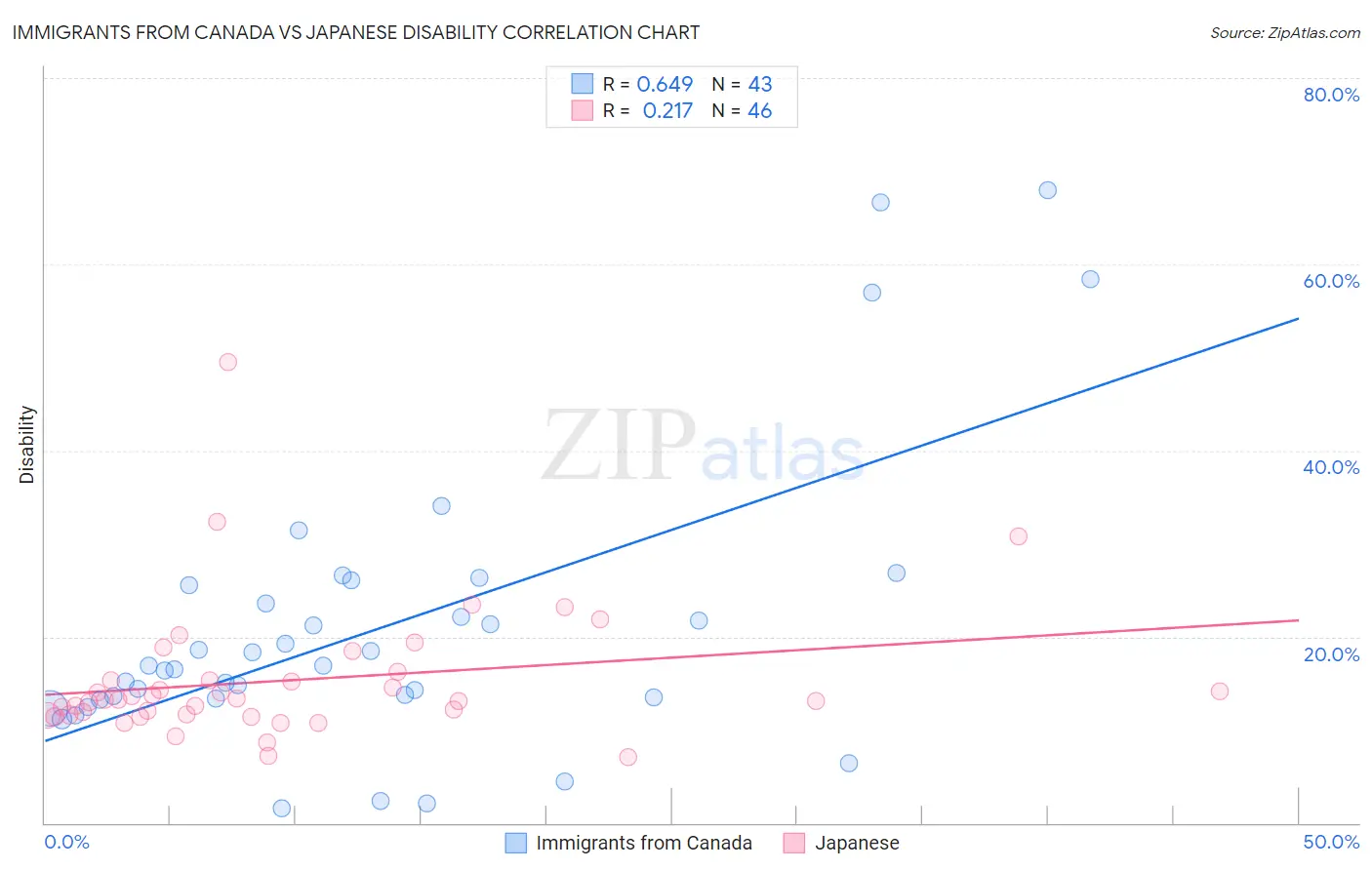Immigrants from Canada vs Japanese Disability
COMPARE
Immigrants from Canada
Japanese
Disability
Disability Comparison
Immigrants from Canada
Japanese
12.1%
DISABILITY
6.1/ 100
METRIC RATING
215th/ 347
METRIC RANK
12.2%
DISABILITY
2.3/ 100
METRIC RATING
234th/ 347
METRIC RANK
Immigrants from Canada vs Japanese Disability Correlation Chart
The statistical analysis conducted on geographies consisting of 459,374,446 people shows a significant positive correlation between the proportion of Immigrants from Canada and percentage of population with a disability in the United States with a correlation coefficient (R) of 0.649 and weighted average of 12.1%. Similarly, the statistical analysis conducted on geographies consisting of 249,165,535 people shows a weak positive correlation between the proportion of Japanese and percentage of population with a disability in the United States with a correlation coefficient (R) of 0.217 and weighted average of 12.2%, a difference of 1.1%.

Disability Correlation Summary
| Measurement | Immigrants from Canada | Japanese |
| Minimum | 1.6% | 7.1% |
| Maximum | 68.0% | 49.5% |
| Range | 66.4% | 42.4% |
| Mean | 21.0% | 15.3% |
| Median | 16.9% | 13.2% |
| Interquartile 25% (IQ1) | 13.3% | 11.6% |
| Interquartile 75% (IQ3) | 25.6% | 15.3% |
| Interquartile Range (IQR) | 12.2% | 3.8% |
| Standard Deviation (Sample) | 15.3% | 7.3% |
| Standard Deviation (Population) | 15.2% | 7.2% |
Demographics Similar to Immigrants from Canada and Japanese by Disability
In terms of disability, the demographic groups most similar to Immigrants from Canada are Immigrants from Somalia (12.0%, a difference of 0.13%), Panamanian (12.1%, a difference of 0.15%), Immigrants from North America (12.1%, a difference of 0.16%), Immigrants from Jamaica (12.1%, a difference of 0.22%), and Croatian (12.1%, a difference of 0.26%). Similarly, the demographic groups most similar to Japanese are Bahamian (12.2%, a difference of 0.030%), Italian (12.2%, a difference of 0.12%), Malaysian (12.2%, a difference of 0.13%), Samoan (12.2%, a difference of 0.16%), and Inupiat (12.2%, a difference of 0.24%).
| Demographics | Rating | Rank | Disability |
| Immigrants | Somalia | 6.8 /100 | #214 | Tragic 12.0% |
| Immigrants | Canada | 6.1 /100 | #215 | Tragic 12.1% |
| Panamanians | 5.4 /100 | #216 | Tragic 12.1% |
| Immigrants | North America | 5.3 /100 | #217 | Tragic 12.1% |
| Immigrants | Jamaica | 5.0 /100 | #218 | Tragic 12.1% |
| Croatians | 4.9 /100 | #219 | Tragic 12.1% |
| Immigrants | Bahamas | 4.7 /100 | #220 | Tragic 12.1% |
| Northern Europeans | 4.2 /100 | #221 | Tragic 12.1% |
| Spanish American Indians | 4.1 /100 | #222 | Tragic 12.1% |
| Hispanics or Latinos | 3.9 /100 | #223 | Tragic 12.1% |
| Mexicans | 3.7 /100 | #224 | Tragic 12.1% |
| Senegalese | 3.5 /100 | #225 | Tragic 12.1% |
| Jamaicans | 3.3 /100 | #226 | Tragic 12.1% |
| Alsatians | 3.3 /100 | #227 | Tragic 12.1% |
| West Indians | 2.9 /100 | #228 | Tragic 12.2% |
| Inupiat | 2.8 /100 | #229 | Tragic 12.2% |
| Samoans | 2.6 /100 | #230 | Tragic 12.2% |
| Malaysians | 2.5 /100 | #231 | Tragic 12.2% |
| Italians | 2.5 /100 | #232 | Tragic 12.2% |
| Bahamians | 2.3 /100 | #233 | Tragic 12.2% |
| Japanese | 2.3 /100 | #234 | Tragic 12.2% |